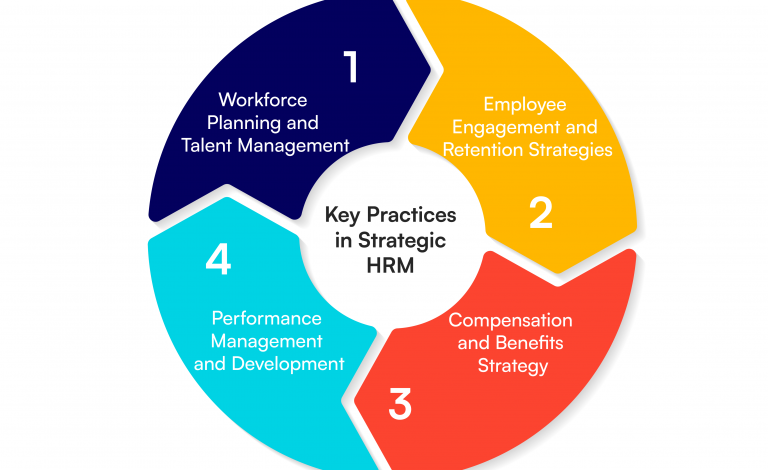Organisational Management: Strategies, Challenges and Trends

Organisational management involves the structured coordination of people, processes and resources to meet a company’s objectives effectively. It plays a pivotal role in shaping strategies, fostering collaboration and charting a course for sustained growth. This discipline goes beyond operational oversight, focusing on the dynamic relationship between individuals and systems to optimise productivity.
Adaptability is at the heart of organisational management, enabling businesses to remain resilient in changing environments. By exploring its core principles, addressing common challenges and examining future trends, organisational management offers a roadmap for success. Through actionable strategies, it equip leaders to navigate complexities and achieve lasting outcomes.
Organisations today face numerous challenges, from navigating an evolving workforce to adopting new technologies, making effective management more critical than ever. With the right tools, principles and leadership strategies, organisations can thrive in even the most uncertain environments.
What is Organisational Management?
Organisational management is the systematic process of planning, organising, leading and controlling an organisation’s resources to achieve specific goals. It integrates various elements, such as strategy development, performance tracking and team coordination, into a cohesive system that drives efficiency and innovation.
Key Components of Organisational Management
- Planning: Establishing clear objectives and identifying the resources and steps needed to achieve them. This phase involves anticipating challenges, setting priorities and aligning actions with organisational goals.
- Organising: Structuring resources, defining roles and creating workflows to ensure tasks are completed efficiently and effectively. Organising also involves optimising resources to avoid redundancies or bottlenecks.
- Leading: Inspiring and guiding teams to perform their best. Leadership involves motivating employees, fostering a positive work culture and providing direction while resolving conflicts when they arise.
- Controlling: Monitoring progress, evaluating performance and making necessary adjustments to keep the organisation on track toward its objectives. This includes tracking results against benchmarks and refining processes where needed.
These components work together to create an environment where people and processes align, enabling organisations to thrive. The emphasis on integration ensures that no business areas operate in isolation, improving cohesion and adaptability.
Why Organisational Management is Crucial
The importance of organisational management cannot be overstated. It acts as a guiding force, ensuring that all parts of an organisation operate in harmony. Here’s why it is indispensable:
Aligning Goals Across the Organisation
A well-managed organisation ensures that everyone, across teams and departments, is working toward shared objectives. This alignment minimises redundancies, enhances collaboration and keeps employees focused on what matters most. Misaligned goals often lead to wasted efforts, which organisational management prevents by providing clarity and direction.
Effective Resource Allocation
Organisational management enables businesses to allocate resources, human, financial and material, more effectively. By optimising resource utilisation, organisations can reduce waste and improve overall efficiency. For instance, identifying underutilised assets or reallocating budgets can lead to significant savings and better outcomes.
Informed Decision-Making
A structured management system provides leaders with actionable insights, enabling them to make well-informed decisions. These decisions help in mitigating risks, seizing opportunities and adapting to changing circumstances. Data-driven approaches, facilitated by management tools, enhance accuracy and confidence in planning.
Enhancing Employee Satisfaction
Employees perform better in environments where processes are clear, leadership is supportive and communication is transparent. Organisational management fosters these conditions, leading to higher morale and engagement. When employees feel that their efforts contribute to a larger purpose, they are more likely to remain loyal and motivated.
Building Long-Term Resilience
Effective management equips organisations to respond proactively to market shifts, technological disruptions and other challenges. This adaptability is crucial for maintaining relevance and achieving long-term success. Resilient organisations often rely on strong management frameworks to weather periods of instability or rapid change.
Principles of Effective Organisational Management
The foundation of successful organisational management lies in adhering to certain key principles. These principles serve as guidelines for creating a harmonious and productive workplace.
Clear Communication
Open and transparent communication ensures everyone understands their roles, expectations and the organisation’s goals. Regular updates, team meetings and feedback loops foster trust and reduce the likelihood of misunderstandings. Communication also extends to listening to employee concerns and adapting strategies accordingly.
Vision and Purpose
A strong vision provides direction and inspires employees to work toward a common purpose. Leaders should articulate the organisation’s mission and connect individual contributions to this broader goal. Employees are more engaged when they understand how their work impacts the organisation’s success.
Employee Development
Investing in professional growth is essential for individual and organisational success. Training programs, mentorship opportunities and career development initiatives help employees build skills and remain motivated. Organisations that prioritise development often benefit from improved performance and innovation.
Adaptability and Flexibility
In a fast-paced business environment, flexibility is key. Organisations must be able to pivot when necessary, adjusting strategies and workflows to meet evolving demands. For example, during economic downturns, flexible organisations can reallocate resources to maintain stability.
Accountability and Performance Tracking
Setting clear expectations and regularly measuring performance ensures accountability at all levels. Using tools like KPIs (Key Performance Indicators) and performance reviews can help organisations stay on track. Accountability fosters a sense of ownership and encourages proactive problem-solving.
Common Challenges in Organisational Management
Even the most well-managed organisations face challenges. Identifying these obstacles is the first step toward overcoming them.
Resistance to Change
Implementing new processes or technologies often meets resistance from employees. This reluctance can stem from fear of the unknown, a lack of understanding or concerns about job security. Overcoming resistance requires clear communication, employee involvement and adequate training.
Balancing Short-Term and Long-Term Goals
Organisations often struggle to maintain a balance between immediate priorities and long-term objectives. While it’s essential to address pressing issues, ignoring future planning can leave organisations vulnerable to market disruptions.
Communication Breakdowns
Ineffective communication can lead to misunderstandings, missed deadlines and reduced morale. Establishing clear channels and fostering a culture of openness can mitigate these risks.
Limited Resources
Budget constraints, workforce shortages or limited time can pose significant challenges. Managers must learn to prioritise tasks and make the most of available resources while seeking innovative solutions to fill gaps.
Employee Disengagement
Low engagement levels among employees can impact productivity and increase turnover rates. Addressing disengagement requires understanding employee needs, providing recognition and fostering a sense of belonging.
Strategies for Effective Organisational Management
Here are a few effective organisational management strategies that can help you in your business:
Leveraging Technology
Technological tools can streamline processes, improve communication and enhance decision-making. Project management platforms, CRM systems and data analytics software enable organisations to operate more efficiently.
Encouraging Collaboration
Creating opportunities for teamwork across departments can lead to innovative solutions and improved problem-solving. Regular brainstorming sessions, team-building activities and cross-functional projects foster a collaborative culture.
Setting SMART Goals
SMART goals (Specific, Measurable, Achievable, Relevant and Time-bound) provide a clear framework for success. By setting realistic objectives, organisations can ensure progress while maintaining employee morale.
Prioritising Employee Well-Being
Organisations that value employee well-being experience higher productivity and lower turnover rates. Initiatives such as flexible work arrangements, wellness programs and mental health support contribute to a positive workplace culture.
Promoting Feedback and Continuous Improvement
Feedback loops are essential for growth. Regularly gathering input from employees and stakeholders helps organisations identify areas for improvement and adjust strategies accordingly.
The Role of Leadership in Organisational Management
Leadership is a critical component of organisational management. Strong leaders inspire confidence, guide teams and create an environment where employees feel valued and motivated.
Leading by Example
Leaders who demonstrate integrity, accountability and dedication set the tone for the rest of the organisation. Their actions influence workplace culture and inspire employees to uphold similar standards.
Supporting Team Development
Great leaders invest in their teams, identifying strengths and providing growth opportunities. By nurturing talent, they ensure the organisation is prepared for future challenges.
Fostering a Culture of Trust
Trust is the foundation of any successful organisation. Leaders who listen, communicate openly and involve employees in decision-making create a supportive and collaborative atmosphere.
The Future of Organisational Management
As businesses evolve, so do the practices and tools used in organisational management. Emerging trends are reshaping how organisations operate, creating opportunities and challenges.
Embracing Remote Work
Remote and hybrid work models are here to stay. Managers must adapt by leveraging virtual collaboration tools, ensuring clear communication and maintaining a strong organisational culture despite physical distances.
Integrating Artificial Intelligence
AI and automation are transforming organisational management by streamlining operations, improving data analysis and enabling predictive decision-making. Embracing these technologies can lead to more efficient processes and better outcomes.
Sustainability as a Priority
Modern organisations are expected to integrate sustainable practices into their operations. From reducing environmental impact to promoting social responsibility, sustainability has become a key organisational success.
Lifelong Learning
Rapid technological advancements demand continuous upskilling. Organisations must foster a learning culture that encourages employees to stay updated and adaptable to industry changes.
Final Reflections on Organisational Management
Organisational management is not just a framework. It’s a continuous process of aligning people, processes and goals. By embracing principles like communication, adaptability and accountability, organisations can create a foundation for sustained success.
Addressing challenges, investing in people and staying ahead of industry trends is essential for thriving in today’s competitive environment.




